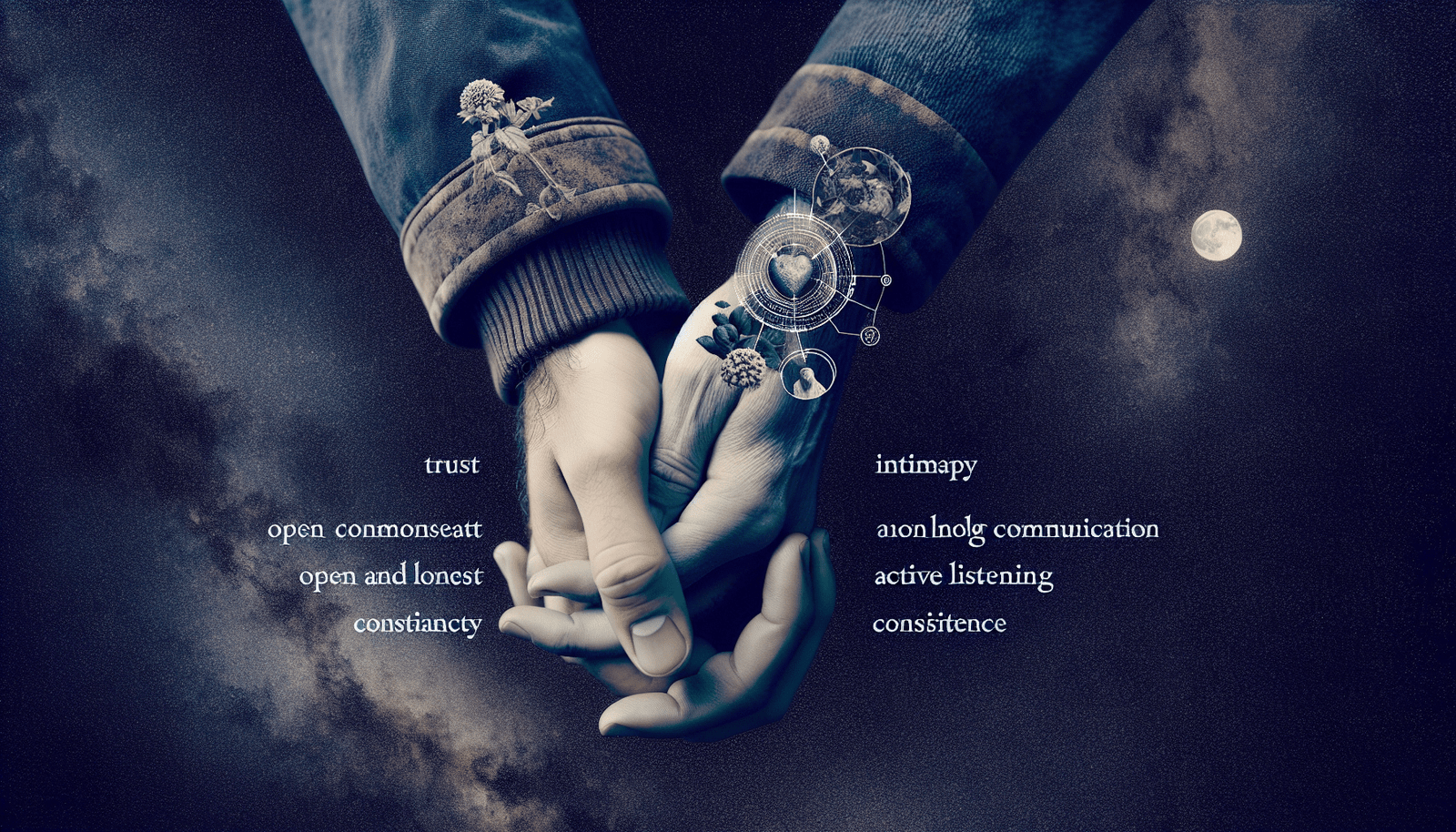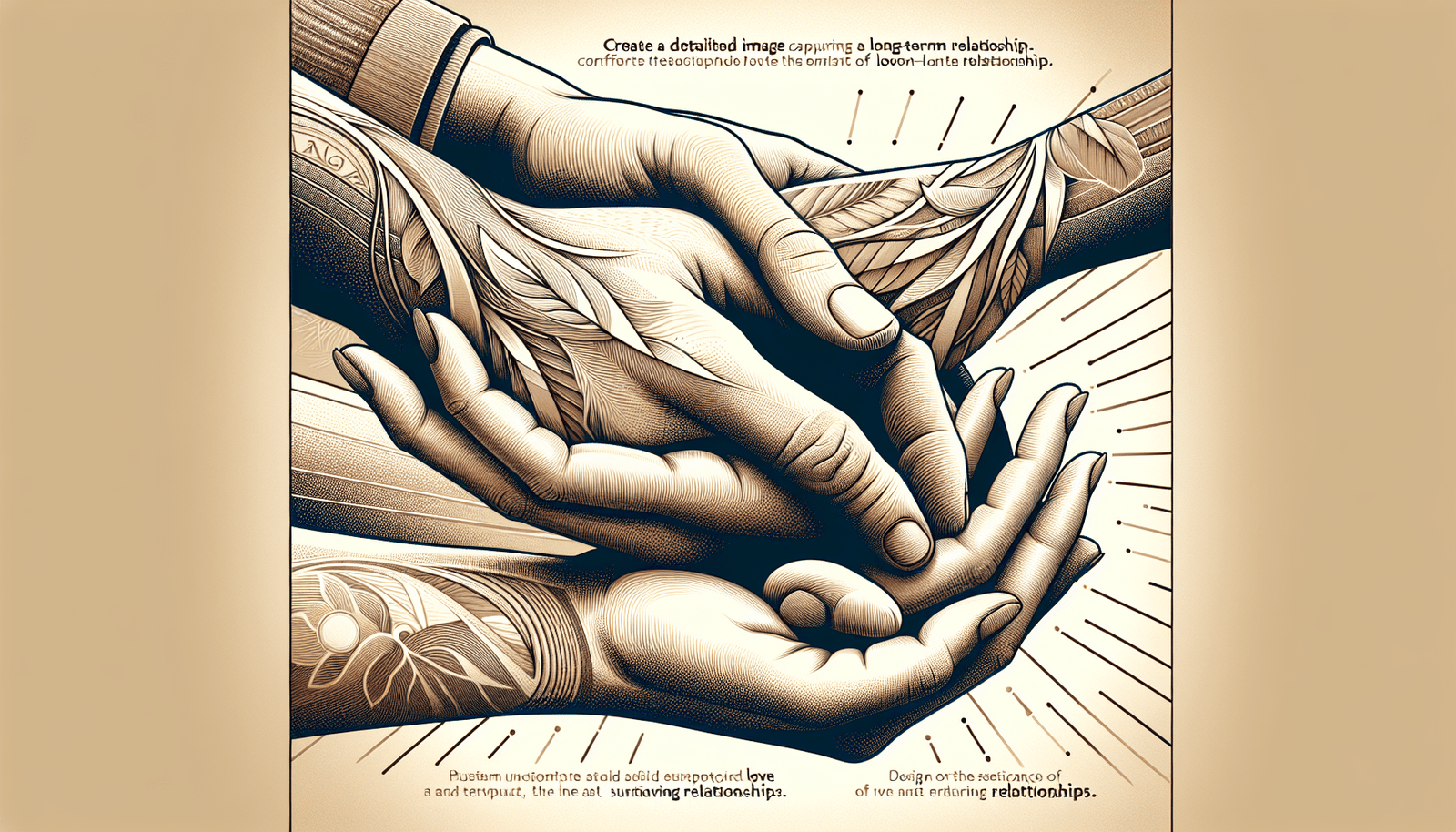Long-Term Relationships
Long-Term Relationships can be both rewarding and challenging, but with the right tools and support, you can navigate this journey with ease. In this article, we explore the concept of long-term relationships and introduce Jasper, the best writing assistant, who will guide and assist you every step of the way. So whether you’re new to long-term relationships or looking to strengthen your existing one, let’s embark on this exciting adventure together!
Building trust and communication
Open and honest conversations
In a long-term relationship, open and honest communication is vital. It’s important to create an environment where you and your partner feel comfortable discussing your thoughts, feelings, and concerns. By promoting open conversations, you can build trust and deepen your connection. This means being transparent about your desires, fears, and hopes. By openly sharing your thoughts and actively listening to your partner’s input, you can foster trust and create a strong foundation for your relationship.
Active listening
Active listening is another crucial aspect of effective communication in a long-term relationship. It involves fully concentrating on what your partner is saying and responding in a way that shows understanding and empathy. This means avoiding distractions, maintaining eye contact, and providing verbal or non-verbal cues that you are actively engaged in the conversation. By actively listening, you can gain a deeper understanding of your partner’s perspective, create a safe space for sharing, and strengthen the bond between you.
Consistency and reliability
Consistency and reliability are essential for building trust in a long-term relationship. Consistency means being dependable and following through on your commitments. It involves showing up for your partner both physically and emotionally, and being reliable in terms of your actions and words. When you consistently demonstrate your trustworthiness, your partner can feel secure and confident in the relationship. Trust is built gradually through consistent behavior, and it is a fundamental pillar of a healthy and enduring bond.
Maintaining intimacy and romance
Date nights
In the hustle and bustle of daily life, it’s important to make time for each other and prioritize maintaining intimacy and romance. Date nights are a wonderful way to keep the spark alive and nurture your connection. Set aside dedicated time to go on regular dates, whether it’s a romantic dinner, a shared activity, or a simple walk in the park. Date nights provide an opportunity to focus solely on each other, create new memories, and reignite the passion that brought you together in the first place.
Physical touch and affection
Physical touch and affection play a significant role in maintaining intimacy and romance in a long-term relationship. From holding hands and hugging to cuddling and kissing, these gestures of love can strengthen the emotional bond between you and your partner. Even small displays of physical affection, such as a gentle touch on the arm or a back rub, can communicate love and reinforce feelings of closeness. Remember to prioritize physical touch as an important part of your relationship, as it can enhance your emotional connection and keep the flame alive.
Surprise gestures and gifts
Surprise gestures and gifts are delightful ways to show your partner that you care and appreciate them. From leaving sweet notes to planning surprise getaways, these acts of thoughtfulness can bring excitement and joy into your relationship. Surprise gestures don’t have to be grand or expensive; they can be as simple as preparing your partner’s favorite meal or surprising them with tickets to a movie they’ve been wanting to see. By keeping the element of surprise alive, you can keep the romance alive and continuously show your love and appreciation.
Supporting each other’s goals and dreams
Encouragement and motivation
Supporting your partner’s goals and dreams is essential for a long-lasting and fulfilling relationship. Whether they want to pursue a career change, start a new hobby, or embark on a personal project, it’s important to be their cheerleader and source of encouragement. By providing support and motivation, you can help your partner overcome obstacles and reach their full potential. Celebrate their achievements, offer words of encouragement, and remind them of their strengths during challenging times. By being each other’s biggest supporters, you can create a nurturing environment that allows both of you to thrive.
Sharing responsibilities
In a long-term relationship, it’s important to share responsibilities and work as a team. This means dividing household chores, financial obligations, and other duties in a fair and equitable manner. By sharing responsibilities, you can prevent resentment from building up and ensure that both partners feel valued and supported. Regularly communicate and reassess the division of responsibilities to ensure it remains balanced and suits the needs and aspirations of both partners. Remember, a strong partnership is built on collaboration and teamwork.
Respecting individual aspirations
While supporting each other’s goals and dreams, it’s crucial to also respect and honor each other’s individual aspirations. Each partner in a relationship is entitled to pursue their own personal growth and fulfillment. This means recognizing and appreciating that you and your partner are unique individuals with separate dreams and desires. Encourage personal growth, celebrate individual achievements, and provide space for each other to explore and pursue their passions. By respecting individual aspirations, you can create a relationship that encourages personal development and allows both partners to flourish.
Creating shared experiences and memories
Traveling together
Traveling together is an incredible way to create shared experiences and build lasting memories. Whether it’s a weekend getaway to a nearby town or an exotic adventure to a far-flung destination, exploring new places together can strengthen your bond and deepen your connection. Traveling allows you to step outside of your comfort zones, learn new things about each other, and create cherished memories that you can reminisce about in the years to come. From discovering new cultures to overcoming challenges as a team, the shared experiences during travel can bring you closer and enrich your relationship.
Trying new activities
Trying new activities together can be a fun and exciting way to create shared experiences and keep your relationship fresh. From cooking classes and hiking trips to dance lessons and art workshops, there are countless opportunities to explore new interests as a couple. By engaging in activities that are new to both of you, you can support each other’s growth, discover shared passions, and bring a sense of adventure into your relationship. Trying new activities together fosters collaboration, communication, and the opportunity to learn and grow as a couple.
Celebrating milestones
Celebrating milestones is an important part of creating shared experiences and acknowledging the journey of your relationship. Whether it’s your anniversary, a promotion at work, or the completion of a personal goal, taking the time to celebrate these milestones together can strengthen your bond and create lasting memories. Plan special activities or surprises to commemorate these moments, such as a romantic dinner, a weekend getaway, or a thoughtful gift. By celebrating milestones, you acknowledge the growth and achievements in your relationship and show gratitude for the journey you have shared.
Navigating challenges and conflicts
Effective communication during disputes
Challenges and conflicts are inevitable in any relationship, but how you navigate them can determine the strength and longevity of your bond. During disputes, it’s crucial to practice effective communication to ensure that both partners feel heard and understood. This involves speaking calmly, using “I” statements to express your feelings, and actively listening to your partner’s perspective. Avoid blaming or criticizing, and instead focus on finding a resolution that takes both partners’ needs into consideration. Effective communication during disputes can prevent misunderstandings, build trust, and foster a sense of understanding and compromise.
Finding compromise
Finding compromise is an essential skill in any long-term relationship. It involves finding a middle ground that satisfies both partners’ needs and desires. When faced with conflicting opinions or wants, it’s important to approach the situation with a willingness to understand each other’s perspectives and collaborate on finding a solution. Compromise requires open-mindedness, flexibility, and a genuine desire to find a resolution that benefits both partners. By finding compromise, you can navigate challenges and conflicts together, strengthen your problem-solving skills, and maintain a harmonious relationship.
Seeking professional help if needed
Sometimes, challenges in a relationship can be too complex or overwhelming to resolve on your own. In such cases, seeking professional help through couples therapy or counseling can be a beneficial step. Therapists and counselors are trained to provide guidance and support in navigating relationship challenges. They can help you and your partner identify underlying issues, improve communication skills, and develop strategies for resolving conflicts. Seeking professional help is a sign of strength and a proactive approach to fostering a healthy, fulfilling, and long-lasting relationship.
Maintaining a healthy work-life balance
Prioritizing quality time together
Maintaining a healthy work-life balance is crucial for a thriving long-term relationship. It’s important to prioritize quality time together amidst busy schedules and competing responsibilities. Set aside dedicated time for activities that you both enjoy, whether it’s going for a walk, cooking a meal together, or simply having a heartfelt conversation. By making quality time a priority, you can strengthen your connection, deepen your intimacy, and create a sense of stability and security in your relationship.
Encouraging self-care
Taking care of yourself is just as important as taking care of your relationship. Encourage each other to prioritize self-care, which includes activities that promote physical, mental, and emotional well-being. This can range from regular exercise and healthy eating to engaging in hobbies and pursuing personal interests. By prioritizing self-care, you can recharge and show up as your best self in the relationship. Additionally, encouraging your partner to engage in self-care demonstrates your support, love, and understanding.
Setting boundaries with work
Setting boundaries with work is crucial for maintaining a healthy work-life balance. It’s important to establish clear guidelines and limits regarding the amount of time and energy you devote to your job. Communicate openly with your partner about your work-related commitments and expectations, and work together to find a balance that suits both your personal and professional lives. By setting boundaries, you can prevent work from encroaching on your relationship and ensure that you have the time and energy to invest in your partnership.
Showing appreciation and gratitude
Small acts of kindness
Small acts of kindness are an effective way to show your appreciation and gratitude towards your partner. These gestures can include anything from preparing breakfast in bed, leaving a sweet note, or offering to run errands. By performing thoughtful acts of kindness, you demonstrate that you value and cherish your partner’s presence in your life. These small acts can have a big impact and foster a sense of love, care, and appreciation in your relationship.
Expressing gratitude regularly
Expressing gratitude regularly is essential for maintaining a healthy and fulfilling long-term relationship. Take the time to express your gratitude for your partner’s presence, support, and contributions. Verbalize your appreciation for the little things they do, as well as the qualities that you admire in them. By expressing gratitude, you not only uplift your partner’s spirits but also strengthen the foundation of your relationship. Gratitude cultivates a positive atmosphere, fosters contentment, and reinforces the bond between you and your partner.
Acknowledging efforts and contributions
Acknowledging your partner’s efforts and contributions is another way to show appreciation and foster a strong bond. Recognize and affirm the hard work they put into the relationship, as well as their achievements in various aspects of life. Celebrate their successes, both big and small, and acknowledge the role they play in your shared life. By acknowledging each other’s efforts and contributions, you create a supportive and nurturing environment where both partners feel valued and appreciated.
Continuously evolving and growing together
Supporting personal development
Supporting personal development is essential for a long-term relationship to thrive. Encourage each other to pursue personal growth and development, whether it’s through education, hobbies, or self-improvement endeavors. Support your partner’s aspirations and provide opportunities for self-discovery and exploration. By supporting personal development, you not only strengthen the individual but also promote a sense of growth and continuous learning within the relationship.
Embracing change and adapting
Change is a natural part of life and relationships. Embracing change and being adaptable is a valuable trait in a long-term relationship. Be open to the growth and transformation that occurs throughout the journey of your partnership. Embrace new experiences, challenges, and opportunities together, and be willing to adapt your perspectives and expectations as you both evolve. By embracing change and adapting, you create a relationship that is dynamic, resilient, and capable of weathering any storm that comes its way.
Reevaluating goals and plans
Evaluating and reevaluating goals and plans is crucial for maintaining a sense of direction and purpose in a long-term relationship. As individuals and as a couple, it’s important to regularly reevaluate your goals, both individually and collectively, and adjust them as needed. This allows you to stay aligned, ensure that your aspirations are still in harmony, and make any necessary adjustments to keep moving forward together. Reevaluating goals and plans allows you to grow and evolve as a couple, and ensures that your relationship remains fulfilling and purposeful.
Creating a home and future together
Shared living space
Creating a home together involves more than just sharing a physical space. It’s about creating an environment that is warm, welcoming, and aligned with both partners’ preferences and needs. Discuss and collaborate on the layout and decor of your shared living space, ensuring that both of you feel comfortable and at ease in your home. By creating a shared living space, you not only build a physical home but also foster a sense of belonging and togetherness.
Financial planning and decision-making
Financial planning and decision-making are important aspects of building a future together. It’s crucial to discuss and align your financial goals, budgeting strategies, and long-term plans. Collaborate on making financial decisions and ensure that both partners are involved in the process. By having open and transparent conversations about money matters, you can minimize conflicts, promote understanding, and work together towards your financial aspirations.
Discussing long-term plans
Discussing long-term plans is essential for a thriving long-term relationship. Take the time to talk about your visions for the future, both individually and as a couple. Discuss topics such as marriage, children, career goals, and retirement plans, and ensure that you are on the same page. By openly discussing and aligning your long-term plans, you create a sense of shared purpose and build a strong foundation for a fulfilling future together.
Building a network of support
Family and friends
Building a network of support is important for a healthy and thriving long-term relationship. Nurture and maintain the relationships you have with your family and friends, as they can provide valuable emotional support and guidance. Engage in activities together, share experiences, and rely on their support during challenging times. By building a strong network of family and friends, you create a sense of belonging and ensure that you have a support system to lean on.
Couples therapy or counseling
Couples therapy or counseling can be a valuable resource for strengthening a long-term relationship. Seeking professional help can provide an objective perspective, guidance, and strategies for navigating the challenges that come with a committed partnership. Whether you’re looking to work through specific issues or enhance communication skills, couples therapy can help you and your partner build a healthier and more fulfilling relationship.
Joining community groups
Joining community groups can provide an avenue for expanding your network and finding support within your local community. Look for groups or organizations that align with your interests, values, or shared hobbies. By joining these groups together, you can meet new people, engage in activities that you enjoy, and build relationships with like-minded individuals. Joining community groups can contribute to a sense of belonging, foster personal growth, and provide additional support for your long-term relationship.
In conclusion, building and maintaining a long-term relationship requires effort, commitment, and effective communication. From fostering trust and intimacy to supporting each other’s goals and dreams, there are numerous strategies that can help you create a healthy, loving, and enduring bond. By continuously evolving and adapting, and by nurturing your connection through shared experiences, appreciation, and open communication, you can build a strong foundation for a fulfilling and lasting partnership. Remember, a successful long-term relationship is a journey that involves both individuals growing together and supporting each other every step of the way.






